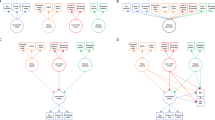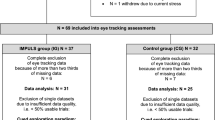Abstract
Background:
A subgroup of overweight and obese people is characterized by binge eating disorder (BED). Increased impulsivity has been suggested to cause binge eating and subsequent weight gain. In the current study, neuronal correlates of increased impulsivity in binge eating disorder during behavioral response inhibition were investigated.
Methods:
Magnetic brain activity and behavioral responses of 37 overweight and obese individuals with and without diagnosed BED were recorded while performing a food-related visual go–nogo task. Trait impulsivity was assessed with the Barratt Impulsiveness Scale (BIS-11).
Results:
Specifically, increased attentional impulsiveness (a subscale of the BIS-11) in BED was related to decreased response inhibition performance and hypoactivity in the prefrontal control network, which was activated when response inhibition was required. Furthermore, participants with BED showed a trend for a food-specific inhibition performance decline. This was possibly related to the absence of a food-specific activity increase in the prefrontal control network in BED, as observed in the control group. In addition, an increase in activity related to the actual button press during prepotent responses and alterations in visual processing were observed.
Conclusions:
Our results suggest an attentional impulsiveness-related attenuation in response inhibition performance in individuals with BED. This might have been related to increased reward responsiveness and limited resources to activate the prefrontal control network involved in response inhibition. Our results substantiate the importance of neuronal markers for investigating prevention and treatment of obesity, especially in specific subgroups at risk such as BED.
This is a preview of subscription content, access via your institution
Access options
Subscribe to this journal
Receive 12 print issues and online access
$259.00 per year
only $21.58 per issue
Buy this article
- Purchase on Springer Link
- Instant access to full article PDF
Prices may be subject to local taxes which are calculated during checkout




Similar content being viewed by others
References
Sonneville KR, Horton NJ, Micali N, Crosby RD, Swanson SA, Solmi F et al. Longitudinal associations between binge eating and overeating and adverse outcomes among adolescents and young adults: does loss of control matter? JAMA Pediatr 2013; 167: 149–155.
Hudson JI, Hiripi E, Pope HG Jr., Kessler RC . The prevalence and correlates of eating disorders in the National Comorbidity Survey Replication. Biol Psychiatry 2007; 61: 348–358.
American Psychiatric Association. Diagnostic and Statistical Mannual of Mental Disorders, 4th edn. American Psychiatric Press: Washington, DC, 1994.
de Zwaan M . Binge eating disorder and obesity. Int J Obes Relat Metab Disord 2001; 25: S51–S55.
Waxman SE . A systematic review of impulsivity in eating disorders. Eur Eat Disord Rev 2009; 17: 408–425.
Schag K, Schonleber J, Teufel M, Zipfel S, Giel KE . Food-related impulsivity in obesity and binge eating disorder—a systematic review. Obes Rev 2013; 14: 477–495.
Dawe S, Loxton NJ . The role of impulsivity in the development of substance use and eating disorders. Neurosci Biobehav Rev 2004; 28: 343–351.
Schag K, Teufel M, Junne F, Preissl H, Hautzinger M, Zipfel S et al. Impulsivity in binge eating disorder: food cues elicit increased reward responses and disinhibition. PLoS ONE 2013; 8: 0076542.
Schienle A, Schafer A, Hermann A, Vaitl D . Binge-eating disorder: reward sensitivity and brain activation to images of food. Biol Psychiatry 2009; 65: 654–661.
Balodis IM, Kober H, Worhunsky PD, White MA, Stevens MC, Pearlson GD et al. Monetary reward processing in obese individuals with and without binge eating disorder. Biol Psychiatry 2013; 73: 877–886.
Aichert DS, Wostmann NM, Costa A, Macare C, Wenig JR, Moller HJ et al. Associations between trait impulsivity and prepotent response inhibition. J Clin Exp Neuropsychol 2012; 34: 1016–1032.
Mobbs O, Iglesias K, Golay A, Van der Linden M . Cognitive deficits in obese persons with and without binge eating disorder. Investigation using a mental flexibility task. Appetite 2011; 57: 263–271.
Aron AR, Robbins TW, Poldrack RA . Inhibition and the right inferior frontal cortex. Trends Cogn Sci 2004; 8: 170–177.
Chikazoe J, Jimura K, Asari T, Yamashita K, Morimoto H, Hirose S et al. Functional dissociation in right inferior frontal cortex during performance of go/no-go task. Cereb cortex 2009; 19: 146–152.
Asahi S, Okamoto Y, Okada G, Yamawaki S, Yokota N . Negative correlation between right prefrontal activity during response inhibition and impulsiveness: a fMRI study. Eur Arch Psychiatry Clin Neurosci 2004; 254: 245–251.
Horn NR, Dolan M, Elliott R, Deakin JF, Woodruff PW . Response inhibition and impulsivity: an fMRI study. Neuropsychologia 2003; 41: 1959–1966.
Hege MA, Preissl H, Stingl KT . Magnetoencephalographic signatures of right prefrontal cortex involvement in response inhibition. Hum Brain Mapp 2014; e-pub ahead of print 21 May 2014; doi:10.1002/hbm.22546.
Wittchen HU, Wunderlich U, Gruschwitz S, Zaudig M . SKID-I. Strukturiertes Klinisches interview für DSM-IV. Achse I: Psychische Störungen, Hogrefe: Göttingen, 1997.
Hilbert A, Tuschen-Caffier B . Eating Disorder Examination Questionnaire—Deutschsprachige Übersetzung. Verlag für Psychotherapie: Münster, 2006.
Hautzinger M, Keller F, Kühner C . BDI-II. Beck Depressions Inventar Revision—Manual. Harcourt Test Services: Frankfurt, 2006.
Preuss UW, Rujescu D, Giegling I, Watzke S, Koller G, Zetzsche T et al. Psychometrische Evaluation der deutschsprachigen Version der Barratt-Impulsiveness-Skala. Der Nervenarzt 2008; 79: 305–319.
Mattout J, Henson RN, Friston KJ . Canonical source reconstruction for MEG. Comput Intell Neurosci 2007; 67613.
Patton JH, Stanford MS, Barratt ES . Factor structure of the Barratt impulsiveness scale. J Clin Psychol 1995; 51: 768–774.
Miller BT, D'Esposito M . Searching for ‘the top’ in top-down control. Neuron 2005; 48: 535–538.
Simmonds DJ, Pekar JJ, Mostofsky SH . Meta-analysis of Go/No-go tasks demonstrating that fMRI activation associated with response inhibition is task-dependent. Neuropsychologia 2008; 46: 224–232.
Hester R, D'Esposito M, Cole MW, Garavan H . Neural mechanisms for response selection: comparing selection of responses and items from working memory. Neuroimage 2007; 34: 446–454.
Loeber S, Grosshans M, Korucuoglu O, Vollmert C, Vollstadt-Klein S, Schneider S et al. Impairment of inhibitory control in response to food-associated cues and attentional bias of obese participants and normal-weight controls. Int J Obes (Lond) 2012; 36: 1334–1339.
Carnell S, Gibson C, Benson L, Ochner CN, Geliebter A . Neuroimaging and obesity: current knowledge and future directions. Obes Rev 2012; 13: 43–56.
Balodis IM, Molina ND, Kober H, Worhunsky PD, White MA, Rajita S et al. Divergent neural substrates of inhibitory control in binge eating disorder relative to other manifestations of obesity. Obesity (Silver Spring) 2013; 21: 367–377.
Menon V, Adleman NE, White CD, Glover GH, Reiss AL . Error-related brain activation during a Go/NoGo response inhibition task. Hum Brain Map 2001; 12: 131–143.
Strine TW, Mokdad AH, Dube SR, Balluz LS, Gonzalez O, Berry JT et al. The association of depression and anxiety with obesity and unhealthy behaviors among community-dwelling US adults. Gen Hosp Psychiatry 2008; 30: 127–137.
Grucza RA, Przybeck TR, Cloninger CR . Prevalence and correlates of binge eating disorder in a community sample. Compr Psychiatry 2007; 48: 124–131.
Grilo CM, White MA, Masheb RM . DSM-IV psychiatric disorder comorbidity and its correlates in binge eating disorder. Int J Eat Disord 2009; 42: 228–234.
Sharma L, Markon KE, Clark LA . Toward a theory of distinct types of ‘impulsive’ behaviors: a meta-analysis of self-report and behavioral measures. Psychol Bull 2014; 140: 374–408.
Meule A . Impulsivity and overeating: a closer look at the subscales of the Barratt Impulsiveness Scale. Front Psychol 2013; 4: 177.
Acknowledgements
We thank Maike Borutta for her assistance during the measurements. This study was supported by the Fortüne program of the University of Tübingen (grant numbers: F1561120, F1292005).
Author information
Authors and Affiliations
Corresponding author
Ethics declarations
Competing interests
The authors declare no conflict of interest.
Additional information
Supplementary Information accompanies this paper on International Journal of Obesity website
Supplementary information
Rights and permissions
About this article
Cite this article
Hege, M., Stingl, K., Kullmann, S. et al. Attentional impulsivity in binge eating disorder modulates response inhibition performance and frontal brain networks. Int J Obes 39, 353–360 (2015). https://doi.org/10.1038/ijo.2014.99
Received:
Revised:
Accepted:
Published:
Issue Date:
DOI: https://doi.org/10.1038/ijo.2014.99
This article is cited by
-
Topological features of functional brain networks and subclinical impulsivity: an investigation in younger and older adults
Brain Structure and Function (2024)
-
Disgust sensitivity and behavioural inhibitory systems in binge eating disorder: associations with eating pathology
Eating and Weight Disorders - Studies on Anorexia, Bulimia and Obesity (2023)
-
Secretin modulates appetite via brown adipose tissue-brain axis
European Journal of Nuclear Medicine and Molecular Imaging (2023)
-
Binge eating disorder
Nature Reviews Disease Primers (2022)
-
EEG Neurofeedback in the Treatment of Adults with Binge-Eating Disorder: a Randomized Controlled Pilot Study
Neurotherapeutics (2022)



